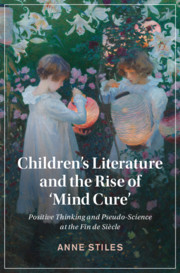 Children's Literature and the Rise of ‘Mind Cure'
Children's Literature and the Rise of ‘Mind Cure' Millennial Motherhood in Charlotte Perkins Gilman’s Herland Trilogy
Published online by Cambridge University Press: 10 December 2020
Chapter five examines the work of American writer, lecturer, and feminist Charlotte Perkins Gilman. While not a children’s author per se, Gilman foregrounded motherhood and childcare in her polemical works and her fiction. She also included unexpected borrowings from New Thought in her novels and life writing. For instance, Gilman’s utopian novel Herland (1915), which appeared serially in her self-published Forerunner Magazine (1909–1916), resonates with Mary Baker Eddy’s Science and Health with Key to the Scriptures (first edition 1875). Gilman's all-female utopia, in which parthenogenesis has replaced sexual reproduction, resembles Eddy's imagined future in which “there will be no more marrying nor giving in marriage” and women and men will increasingly resemble one another in body and mind. The Herlanders’ worship of a loving “Mother Spirit,” their reverence for maternity, and their practice of communal child-rearing likewise mirror Eddy's androgynous “Father-Mother God, all-harmonious” and her emphasis on maternal feeling. Herland thus fulfills Eddy's millennial predictions as well as Gilman's feminist ideals.
To save this book to your Kindle, first ensure [email protected] is added to your Approved Personal Document E-mail List under your Personal Document Settings on the Manage Your Content and Devices page of your Amazon account. Then enter the ‘name’ part of your Kindle email address below. Find out more about saving to your Kindle.
Note you can select to save to either the @free.kindle.com or @kindle.com variations. ‘@free.kindle.com’ emails are free but can only be saved to your device when it is connected to wi-fi. ‘@kindle.com’ emails can be delivered even when you are not connected to wi-fi, but note that service fees apply.
Find out more about the Kindle Personal Document Service.
To save content items to your account, please confirm that you agree to abide by our usage policies. If this is the first time you use this feature, you will be asked to authorise Cambridge Core to connect with your account. Find out more about saving content to Dropbox.
To save content items to your account, please confirm that you agree to abide by our usage policies. If this is the first time you use this feature, you will be asked to authorise Cambridge Core to connect with your account. Find out more about saving content to Google Drive.